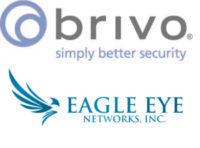Eagle Eye Networks and Brivo jointly announced that Tokyo-based SECOM Co. has made a primary equity investment of $192 million in the two companies.
Eagle Eye Networks and Brivo are independent companies majority owned by Dean Drako. Drako founded Eagle Eye Networks, a leading provider of cloud-based video surveillance products for physical security and business operations applications, in 2012 and serves as CEO. He acquired a majority stake in Brivo in 2015 and serves as chairman. Steven Van Till is founder and president of Brivo, a pioneering cloud services provider of access control, video surveillance, mobile credentials and identity solutions delivered as a SaaS offering.
“The SECOM investment underscores that cloud and AI are the future of physical security,” Drako stated in the announcement. “Both Eagle Eye and Brivo will use a significant portion of the investment to further develop AI that dramatically improves the security of enterprises and businesses globally. The Eagle Eye and Brivo open platforms provide customers with choice, efficiencies, and innovation, all of which this investment will accelerate.”
Established in 1962, SECOM is one of the world’s leading security service providers, offering a wide range of comprehensive security solutions and services to various sectors. The company’s business portfolio encompasses systems integration, fire protection, medical services, insurance, geospatial information services, facility management, among other offerings.
Van Till told SDM the transaction with SECOM was not a typical investment process that involved an investment bank and multiple bidders. “This was more relationship driven. Dean has been working with SECOM for many years. They expressed an interest and we thought they made a great strategic partner,” he said.
According to its website, SECOM launched Japan’s first home security system in 1981 and established a home consumer market. The company is said to have more than 3.5 million subscribers. In addition, the company’s international operations have established offices in 17 countries and territories. SECOM does not currently do business in the United States. With the investment, SECOM will be granted one seat on the boards of each company.
“One of the things that they are interested in through this investment process is increasing the amount of revenue they get outside of Japan. They are the largest security company in Japan,” Van Till explained. “But, obviously, that’s a finite market, and they’re interested in expanding outside. So this kind of investment is the sort of thing that allows them to have more relationships in the rest of the world.”
Eagle Eye Networks will use the investment for continued development of its AI-based analytics capabilities such as Eagle Eye Smart Video Search, Smart Alarms, and Vehicle Intelligence, and to expand its worldwide operations.
Brivo will use the investment to grow sales and marketing, accelerate product development and scale support and operational functions, and evaluate strategic acquisitions. Brivo will also use the additional investment to continue expanding in Europe, Latin America, and Asia Pacific, and enhance the smart spaces and AI functionality in the Brivo Access Platform for its enterprise, multifamily, and commercial real estate customers.
So what might Van Till and Drako be considering on the M&A front where it concerns Brivo specifically?
“The backstory to that is the explosion of PropTech over the last five years or so. Last year alone, there was some $30 billion of new investment. And in the aggregate, $50 to $100 billion over the last five or six years,” Van Till said. “A lot of the companies that have been created are very focused on user experience, tenant experience, co-working, in addition to all of the more consumer-facing things like Zillow and Airbnb, and so forth.”
The overall effect of PropTech, Van Tell explained, has been to raise consciousness around the value of connecting buildings or real estate portfolios back to all kinds of cloud services, including access control and other security services.
“And so one of the types of companies that sprung up around PropTech is experiential companies that are trying to improve tenant experience. We have many of those kinds of companies that are partners, and access control has become an essential part of those kinds of offerings. And so those are areas that we hear customers saying they wish came with Brivo. That’s the kind of thing that we would consider adding.”
From humble beginnings to …
For Van Till, the SECOM investment marks another momentous step in the company’s growth since its founding as a startup in 1999 in Bethesda, Md. From the get-go, Van Till and his partners’ vision was to leverage cloud computing and the internet to transform physical security systems of the day. To say there was skepticism among tradition-minded security practitioners would be an understatement.
“It’s been more exciting every year than it was the year before. And a lot of that has to do with more widespread adoption throughout the industry as part of this PropTech revolution that’s also become a much more valued type of service,” he said. “It’s not just about keeping the bad guys out. It’s about improving the way that people can use buildings and the way that owners realize value in those portfolios.”
In the early years, Brivo could only target small- to medium-sized businesses. The enterprise market could not be bothered; the company’s platform simply lacked feature sets to serve them. Not to mention larger businesses remained leery of the cloud.
Nowadays, Van Till said the enterprise segment is the company’s fastest growing segment of the company — up about 50% in the past year in terms of revenue.
“We have come full circle to being not just an application for one segment or one part of the market, but something that spans everything from the smallest business to the largest business,” he continued. “There isn’t a vertical market or a type of customer that we’re not in. Geographic coverage, we’re in every zip code in the United States. Now we’re expanding into 60 countries, so huge penetration up and down the ladder and across the globe.”




